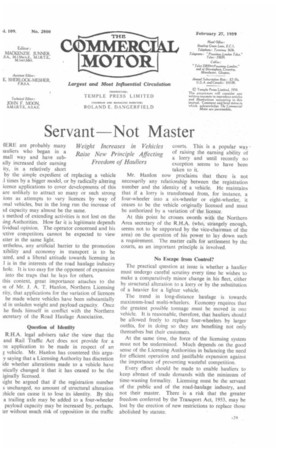Servant Not Master
Page 31

If you've noticed an error in this article please click here to report it so we can fix it.
IERE are probably many muliers who began in a mall way and have subally increased their earning ity, in a relatively short by the simple expedient of replacing a vehicle .1 times by a bigger model, or by radically altering icence applications to cover developments of this are unlikely to attract so many or such strong ions as attempts to vary licences by way of anal vehicles, but in the long run the increase of td capacity may almost be the same.
s method of extending activities is not lost on the ing Authorities. How far it is legitimate depends lividual opinion. The operator concerned and his ctive competitors cannot be expected to view atter in the same light.
'ertheless, any artificial barrier to the promotion xibility and economy in transport is to be !ated, and a liberal attitude towards licensing in 1 is in the interests of the road haulage industry hole. It is too easy for the opponent of expansion into the traps that he lays for others.
this context, great importance attaches to the in of Mr. J. A. T. Hanlon, Northern Licensing rity, that applications for the variation of licences be made where vehicles have been substantially A. in unladen weight and payload capacity. Once he finds himself in conflict with the Northern ;ecretary of the Road Haulage Association.
Question of Identity R.H.A. legal advisers take the view that the and Rail Traffic Act does not provide for a pn application to be made in respect of an ; vehicle. Mr. Hanlon has countered this arguy saying that a Licensing Authority has discretion ide whether alterations made to a vehicle have stically changed it that it has ceased to be the iginally licensed.
tight be argued that if the registration number s unchanged, no amount of structural alteration hicle can cause it to lose its identity. By this a trailing axle may be added to a four-wheeler payload capacity may be increased by, perhaps, ter without much risk of opposition in the traffic courts. This is a popular way of raising the earning ability of a lorry and until recently no exception seems to have been taken to it.
Mr. Hanlon now proclaims that there is not necessarily any relationship between the registration number and the identity of a vehicle. He maintains that if a lorry is transformed from, for instance, a four-wheeler into a six-wheeler or eight-wheeler, it ceases to be the vehicle originally licensed and must be authorized by a variation of -the.licence.
At this point he crosses swords with the Northern Area secretary of the R.H.A. (who, strangely enough, seems not to be supported by the vice-chairman of the area) on the question of his power to lay down such a requirement. The matter calls for settlement by the courts, as an important principle is involved.
No Escape from Control?
The practical question at issue is whether a haulier must undergo careful scrutiny every time he wishes to make a comparatively minor change in his fleet, either by structural alteration to a lorry or by the substitution of a heavier for a lighter vehicle.
The trend in long-distance haulage is towards maximum-load multi-wheelers. Economy requires that the greatest possible tonnage must be moved in one vehicle. It is reasonable, therefore, that hauliers should be allowed freely to replace four-wheelers by larger outfits, for in doing so they are benefiting not only themselves but their customers.
At the same time, the force of the licensing system must not be undermined. Much depends on the good sense of the Licensing Authorities in balancing the need for efficient operation and justifiable expansion against the importance of preventing wasteful competition.
Every effort should be made to enable hauliers to keep abreast of trade demands with the minimum of time-wasting formality. Licensing must be the servant of the public and of the road-haulage industry, and not their master. There is a risk that the greater freedom conferred by the Transport Act, 1953, may be lost by the erection of new restrictions to replace those abolished by statute.




































































































